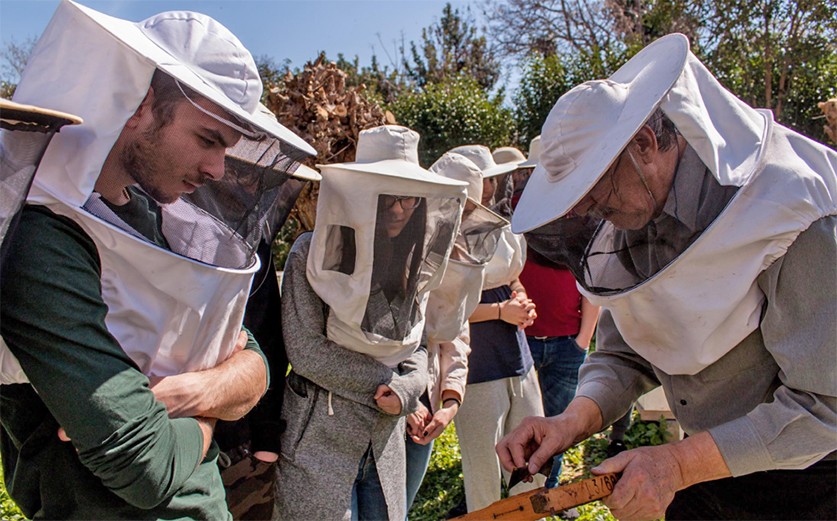Larissa, Greece – After a successful year in Volos and Karditsa, the program of training seminars in apiculture, implemented by the Agricultural University of Athens (AUA) as part of the New Agriculture for a New Generation program, has begun its second year in three new cities in Thessaly. The program offers young people with an interest in beekeeping 100 hours of theoretical and practical training. Under the direction of Paschalis Harizanis, a professor in the Faculty of Crop Science and Director of the Laboratory of Sericulture and Apiculture at AUA, the program is currently running in Larissa, Lamia, and Aliartos. Paschalis and his team travel to these cities to lead four-day training sessions throughout the spring.
The team from AUA consists of Paschalis, a full professor; Assistant Professor Georgios Goras; Lab Professor Dimitrios Lazarakis; three PhD candidates and trained beekeepers, Thanasis, Yiannis, and Vaggelis; and Dimitris Mavronasios, who received his BA from AUA and runs a good beekeeping business in Corinth with over 200 colonies.
In Larissa, the 20 beneficiaries come from diverse backgrounds, and most don’t have hives yet, though some have family background in beekeeping. Anastasia Dimitriadou, a hotel manager from Orestiada, became interested in beekeeping while searching for healthy, natural food products for her young children. Dimitris Theodorakis, an agronomist in his second year at the Technological Educational Institute (TEI) of Thessaly, wants to create his own bee products while enriching his apple, cherry, and chestnut cultivations. And Ioannis Theodorou, who studied Business Administration at TEI and already has two bee colonies, dreams of turning his ancestral home in the village in Pyrgetos, Olympus, into a beekeeping center where he can sell his products and hold beekeeping events and exhibits.
The four-day seminars take place at the Averofios Farm School in Larissa from 9.00 to 14.00. Participants spent half their time inside the lecture hall learning theory and the other half outside doing practical training in the field, using the bee hives at Averofios for demonstrations.
“It was so helpful to have Professor Harizanis and Dimitris walk us through every step from the beginning,” Anastasia said. “I didn’t want the seminar to end!”
They each received a textbook written by Professor Harizanis that details everything they need to know about beekeeping as well as access to notes, internet resources, and over 55 instructional videos, 15-20 minutes long, created by Harizanis and his lab. The videos show participants how to open and inspect the hive, how do light pine needles in the smoker, and how to set up and paint a hive correctly so that it will last for 40-50 years. The beneficiaries also have the opportunity to meet professional beekeepers from Larissa.
A sample business plan provided by the program models growth from five to 240 bee colonies in six years. “By the end of the program, the beneficiaries will get a complete education in apiculture,” Paschalis said. “We keep in touch with them over the next two years to follow up on their progress and offer advice and help with their new businesses.”

